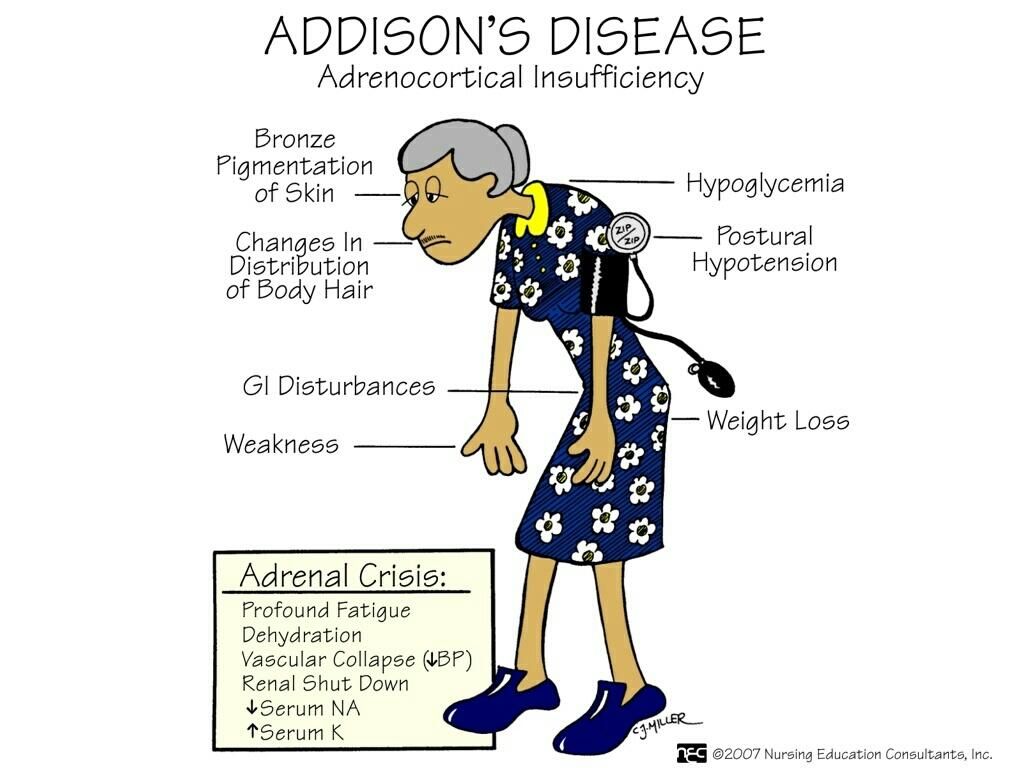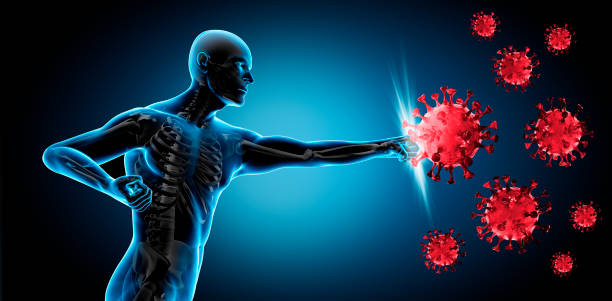Adrenal insufficiency is a disorder that occurs when the adrenal glands don’t make enough of certain hormones. The adrenal glands are located just above the kidneys. Adrenal insufficiency can be primary, secondary, or tertiary.
What is Addison’s Disease a.k.a Adrenal insufficiency?
Addison’s disease (also known as primary adrenal insufficiency and hypocortisolism) is a medical condition that occurs when the body’s endocrine system does not produce sufficient adrenal hormones, especially cortisol and aldosterone. Insufficient adrenal hormone production affects many functions in the body which leads to Addison’s disease, or primary adrenal insufficiency.
Most cases of adrenal insufficiency result from an autoimmune disorder known as adrenalitis that causes the immune system to attack and damage cells of the adrenal glands. Adrenal insufficiency may also develop due to other diseases and infections like tuberculosis, cancers, damage to the adrenal glands, fungal infections and HIV.
Adrenal deficiency can influence your body’s capacity to answer pressure and keep up with other fundamental life capabilities. With treatment, a great many people with adrenal deficiency can have a typical, dynamic life.
Addison’s disease Facts
- Also known as primary adrenal insufficiency or hypoadrenalism.
- It is a rare disorder of the adrenal glands.
- The adrenal glands are 2 small glands that sit on top of the kidneys. They produce 2 essential hormones: cortisol and aldosterone.
- The adrenal gland is damaged in Addison’s disease, so it does not produce enough cortisol or aldosterone.
- It can affect people of any age, although it’s most common between the ages of 30 and 50.
- It’s more common in women than men.
- Addison’s disease is rare. In developed countries, it affects about 100 to 140 of every million people.
- Secondary adrenal insufficiency is more common, affecting 150 to 280 people per million.
- Addison’s infection is intriguing; influencing 1 to 6 individuals for each 100,000. And keeping in mind that it is difficult to clean it off of the body, dealing with the sickness through chemical replacement is conceivable. The accompanying incorporates the main 10 Addison’s illness side effects to look out for:
Addison’s Disease Symptoms
This disease symptoms usually develop slowly, often over several months. Often, the disease progresses so slowly that symptoms are ignored until a stress, such as illness or injury, occurs and makes symptoms worse. Signs and symptoms may include:
1. Fatigue
Fatigue is one of the most common symptoms of Addison’s disease. This is understandable considering that adrenal hormones have a role in energy metabolism. This means that when the adrenal glands don’t produce adequate amounts of adrenal hormones, the body is unable to produce all the energy that it requires for its various functions.
Some body works delayed down and you probably won’t feel as vivacious not surprisingly. At the point when this happens for quite a while, it presents as persistent sleepiness, absence of energy and weariness. Adrenal chemicals are likewise associated with the guideline of electrolyte and body liquid equilibrium; factors that influence circulatory strain. Without satisfactory adrenal chemical creation, unfortunate control of sodium-potassium and body liquid equilibrium lead to low circulatory strain intensifying the sensation of shortcoming.
2. Nausea, Vomiting And Diarrhea
Abdominal issues are common symptoms of Addison’s disease that occur in most of patients of the disease. It is not well understood how adrenal insufficiency causes these abdominal problems. However, this may occur because some adrenal hormones have a role in the digestion and absorption of fat, protein and carbohydrates.
At the point when these chemicals are missing or present in low amounts, there might be issues in the processing and assimilation of food. Moreover, in light of the fact that the chemicals that animate craving may not work as expected, the stomach may not be sufficiently ready for the handling of food. On account of constant queasiness, regurgitating, the runs or stomach torment, consider mentioning a test for Addison’s infection.
3. Dizziness
If you get dizzy or have a fainting feeling especially upon standing up, it could be a symptom of Addison’s disease. Dizziness is a result of low blood pressure, which develops due to poor control of electrolytes and fluid in the body. This can cause the body to lose too much fluid, reducing the volume of blood and ultimately leading to low blood pressure.
4. Hyperpigmentation
Hyperpigmentation or darkening of patches of skin can signify the presence of Addison’s disease. The parts of skin that are most prone to discoloration are those that are usually exposed to the sun which include the face, forearms and the elbows. Hyperpigmentation can also affect skin in other parts of the body such as the gums, nail beds and the labia.
5. Salt Cravings
One of the roles of the adrenal hormone known as aldosterone is to regulate electrolytes in the body. These electrolytes include sodium and potassium, which are critical for healthy blood pressure. In the absence of adequate aldosterone hormones, more sodium may be excreted in urine. The excessive loss of sodium deprives the body of this important electrolyte and may lead to low blood pressure besides other effects.
6. Loss of Weight
In addition to fatigue, Addison’s disease can lead to a steady loss of weight. This can be attributed to several factors, one of which is poor appetite. The body requires a certain amount of nutrients to function and to maintain a healthy weight. If your body uses more nutrients than you get from the food that you eat, it may have to get the balance from its tissues.
7. Loss Of Body Hair
Adrenal insufficiency associated with Addison’s disease can lead to hair loss. This is more likely to happen in women. Androgen hormones including DHEA control hair growth. When these hormones are produced in small quantities as a result of adrenal insufficiency, they are inadequate to stimulate normal growth of body hair.
8. Depression
While different conditions can lead to depression, it may also signify the presence of Addison’s disease. Still, on its own, depression cannot be relied on as an Addison’s disease symptom. However, when it occurs together with other symptoms like hyperpigmentation, it would be necessary to have tests conducted to determine the levels of adrenal hormones as well as sodium and potassium.
9. Rapid heartbeat
A rapid heartbeat accompanied by other signs on this list may be a sign of Addison’s disease. As mentioned elsewhere, adrenal insufficiency leads to low blood pressure among other symptoms. But the body still needs glucose and oxygen to produce energy necessary for its many functions.
10. Muscular pain and weakness
There are many conditions that can present with muscle pain and weakness. But these can also be symptoms of adrenal insufficiency. The muscle symptoms may be chronic or intermittent and affect different muscles of the body including the shoulders, hips, arms and legs. The symptoms may also affect different muscles at different times. In some instances, there may also be muscle stiffness making it difficult to move or use the affected muscles.

When to see a doctor
See your doctor if you have common signs and symptoms of Addison’s disease, such as:
- Darkening areas of skin (hyperpigmentation)
- Severe fatigue
- Unintentional weight loss
- Gastrointestinal problems, such as nausea, vomiting and abdominal pain
- Lightheadedness or fainting
- Salt cravings
- Muscle or joint pains
Causes of Addison’s disease
Addison’s disease is caused by damage to your adrenal glands, resulting in not enough of the hormone cortisol and, often, not enough aldosterone as well. Your adrenal glands are part of your endocrine system. They produce hormones that give instructions to virtually every organ and tissue in your body.
Your adrenal glands are composed of two sections. The interior (medulla) produces adrenaline-like hormones. The outer layer (cortex) produces a group of hormones called corticosteroids. Corticosteroids include:
Glucocorticoids. These hormones, which include cortisol, influence your body’s ability to convert food into energy, play a role in your immune system’s inflammatory response and help your body respond to stress.
Mineralocorticoids. These hormones, which include aldosterone, maintain your body’s balance of sodium and potassium to keep your blood pressure normal.
Androgens. These male sex hormones are produced in small amounts by the adrenal glands in both men and women. They cause sexual development in men, and influence muscle mass, sex drive (libido) and a sense of well-being in both men and women.
Primary adrenal insufficiency
When the cortex is damaged and doesn’t produce enough adrenocortical hormones, the condition is called primary adrenal insufficiency. This is most commonly the result of the body attacking itself (autoimmune disease). For unknown reasons, your immune system views the adrenal cortex as foreign, something to attack and destroy. People with Addison’s disease are more likely than others to have another autoimmune disease as well.
Other causes of adrenal gland failure may include:
- Tuberculosis
- Other infections of the adrenal glands
- Spread of cancer to the adrenal glands
- Bleeding into the adrenal glands. In this case, you may have an addisonian crisis without any previous symptoms.
Secondary adrenal insufficiency
The pituitary gland makes a hormone called adrenocorticotropic hormone (ACTH). ACTH in turn stimulates the adrenal cortex to produce its hormones. Benign pituitary tumours, inflammation and prior pituitary surgery are common causes of not producing enough pituitary hormone.
Too little ACTH can lead to too little of the glucocorticoids and androgens normally produced by your adrenal glands, even though your adrenal glands themselves aren’t damaged. This is called secondary adrenal insufficiency. Mineralocorticoid production is not affected by too little ACTH.
Most symptoms of secondary adrenal insufficiency are similar to those of primary adrenal insufficiency. However, people with secondary adrenal insufficiency don’t have hyperpigmentation and are less likely to have severe dehydration or low blood pressure. They’re more likely to have low blood sugar.
A temporary cause of secondary adrenal insufficiency occurs when people who take corticosteroids (for example, prednisone) to treat chronic conditions, such as asthma or arthritis, stop taking the corticosteroids all at once rather than tapering off.
Tertiary adrenal insufficiency
Tertiary adrenal insufficiency starts in the hypothalamus, a small area of the brain near the pituitary. The hypothalamus makes corticotropin-releasing hormone (CRH), a hormone that tells the pituitary to make ACTH. When the hypothalamus doesn’t make enough CRH, the pituitary gland doesn’t make enough ACTH. In turn, the adrenal glands don’t make enough cortisol.
Complications related to Addison’s disease
Addisonian crisis
If you have untreated Addison’s disease, you may develop an addisonian crisis as a result of physical stress, such as an injury, infection or illness. Normally, the adrenal glands produce two to three times the usual amount of cortisol in response to physical stress. With adrenal insufficiency, the inability to increase cortisol production with stress can lead to an addisonian crisis.
An addisonian crisis is a life-threatening situation that results in low blood pressure, low blood levels of sugar and high blood levels of potassium. You will need immediate medical care.
People with Addison’s disease commonly have associated autoimmune diseases.
Prevention of Addison’s disease
- Talk to your doctor if you always feel tired, weak, or are losing weight. Ask about having an adrenal shortage.
- You may need to learn how to increase your dose of corticosteroids.
- If you become very sick, especially if you are vomiting and you can’t take your medication, go to the emergency room.
Some people with Addison’s disease worry about serious side effects from hydrocortisone or prednisone because they know these occur in people who take these steroids for other reasons.
Make sure to follow up with your doctor on a regular basis to make sure your dose is not too high.
What should I eat if I have adrenal insufficiency?
Eating, Diet, and Nutrition for Adrenal Insufficiency & Addison’s Disease
Some people with Addison’s disease who have low aldosterone can benefit from a high-sodium diet. We recommend to consult with a dietician for the best sodium sources and how much sodium you should have each day.
If you take corticosteroids, you may need to protect your bone health by getting enough dietary calcium and vitamin D. A health care professional or a dietitian can tell you how much calcium you should have based on your age. You may also need to take calcium supplements.
Treating Addison’s disease
Addison’s disease is treated with medication to replace the missing hormones. You’ll need to take the medication for the rest of your life.
Most people with the condition have a normal lifespan and are able to live an active life with few limitations.
People with Addison’s disease must be constantly aware of the risk of a sudden worsening of symptoms, called an adrenal crisis. This can happen when the levels of cortisol in your body fall significantly.
Interested in knowing more watch these videos






